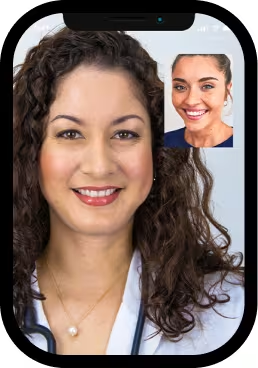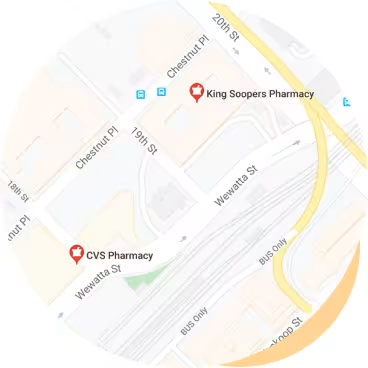- Chronic Care
Chronic Sinusitis
Chronic sinusitis treatment available online today
Request treatment for chronic sinusitis online from our trusted, board-certified doctors and find relief from congestion and pain today. Get a new prescription to treat chronic sinusitis or refill an existing prescription today.*
Book an appointmentReduce inflammation and swelling
Early detection for quick treatment
Breathe better with doctor-recommended prescriptions
*Prescriptions are provided at the doctor's discretion. Learn more about our controlled substances policy and how to save up to 80% with our prescription discount card. PlushCare doctors cannot treat all cases of chronic sinusitis. Our primary care physicians can conduct an initial evaluation of your symptoms but may need to refer you to a specialist or for in-person treatment. If you are experiencing life-threatening symptoms, seek emergency medical attention immediately.

Learn about chronic sinusitis
The sinuses are nasal cavities in the head that produce thin mucus. The sinuses can become swollen and inflamed when they are infected. This is known as sinusitis. Acute sinusitis lasts only for a few days and can go away on its own with little to no treatment. On the other hand, if the sinusitis lasts longer than three months, it is known as chronic sinusitis. Chronic sinusitis may require treatment.
Chronic sinusitis causes
Some common causes of chronic sinusitis are listed below.
Allergies or asthma: Asthma or allergies can cause inflammation and block sinuses.
Underlying medical conditions: Cystic fibrosis and diseases that weaken the the immune system, e.g., HIV, can lead to nasal blockage.
Nasal polyps: Abnormal growths in the nasal passages can caused blocked sinuses.
Deviated nasal septum: The wall between the nostrils, i.e., nasal septum, can become deviated. The deviated septum can restrict air flow in one of the nostrils, causing blocked sinus.
Respiratory infections: Bacterial infections, viral infections, or fungal infections can cause swelling and block mucus drainage.
Chronic sinusitis symptoms
Symptoms of chronic sinusitis may include:
Congested nose / nasal inflammation
Facial pressure or pain
Postnasal drip
Thick yellow or green discharge from nose
Pain in other parts of the face, such as the ear, head and/or tooth
Loss of taste and smell
Fatigue

How to treat chronic sinusitis
Typically, chronic sinusitis treatments involve the use of medication to reduce inflammation and are discussed in the next section. Other options for treating chronic sinusitis include:
Saline nasal irrigation: Flushing the nasal cavity with saline solution can reduce inflammation and rinse away irritants and allergies.
Surgery: In some cases which the symptoms of chronic sinusitis do not improve with medicine, surgery maybe performed. Deviated septum can be corrected or nasal polyps can be removed to remove blockage and increase airflow in the nasal cavity.
Chronic sinusitis medication
Several medications can be used to relieve sinusitis symptoms:
Antibiotics: If the cause of the chronic sinusitis is a bacterial infection, systemic and topical antibiotics can be prescribed.
Nasal sprays: Topical intranasal corticosteroids can be used to reduce inflammation.
Oral corticosteroids: These are only used for severe symptoms of chronic sinusitis.
Allergy medication: If the cause of the chronic sinusitis is allergic, allergy medication or allergy shots can be recommended.
Medication for nasal polyps: Injection of omalizumab or dupilumab maybe given to reduce size of the nasal polyps.
Antifungal: If the cause of the chronic sinusitis is a fungal infection, antifungal medication can be used.

How to prevent chronic sinusitis
There are a few steps you can take to help prevent chronic sinusitis.
It is easiest to avoid viral/bacterial/fungal infections by practicing good hygiene. Washing your hands thoroughly with soap kills and removes contagious viruses/bacteria from your hands and should be done before eating.
If you smoke tobacco products, the best way to lower your chances of developing chronic sinusitis is to quit smoking. Also try to avoid exposure to secondhand smoke.
If the chronic sinusitis is caused by allergy, avoid allergens such as animal dander, dust, pollen, smoke and mold that trigger swelling in the sinuses. You may even want to speak to your doctor about getting allergy shots.
Some people find regular nasal saline rinses to be helpful in preventing inflammation.
In addition, stay healthy and keep your immune system up to be able to fend off the flu virus:
Exercise
Get enough sleep
Stay hydrated

When to see a doctor for chronic sinusitis
Talk to a healthcare provider if:
Your sinusitis symptoms last more than 10 days
Your sinusitis symptoms are worsening despite treatment
Chronic sinusitis FAQs
What is the most effective treatment for chronic sinusitis?
The most effective treatment for chronic sinusitis is dependent on the cause. If the cause is bacterial infection, then antibiotics is the most effective treatment. When the cause is due to allergies, then allergy medications are the most helpful. For a deviated septum or nasal polyp, surgery maybe necessary.
Can chronic sinusitis be cured?
Yes, with the proper treatment, chronic sinusitis can be cured.
How do you get rid of chronic sinusitis fast?
The fastest way to get rid of chronic sinusitis begins by seeing your healthcare provider to get the proper treatment. With the cause identified, effective treatment can be prescribed.
How long does it take to get over chronic sinusitis?
Typically, the symptoms of chronic sinusitis last for at least 3 months. Treatment is usually needed to get rid of chronic sinusitis.
What triggers sinusitis?
Sinusitis can be triggered by the following:
Infectious diseases (viral, bacterial, or fungal)
Allergens
Underlying medical conditions, including cystic fibrosis and diseases that weaken the the immune system, e.g., HIV, which can lead to nasal blockage
Nasal polyps, which are abnormal growths in the nasal passages can caused blocked sinus
Deviated nasal septum
What is the difference between chronic sinusitis and acute sinusitis?
Acute sinusitis last only for a few days and can go away on its own with little to no treatment. On the other hand, if the sinusitis lasts longer than three months, it is known as chronic sinusitis. Chronic sinusitis may require treatment.
How do I know if my sinusitis is chronic?
If your sinusitis symptoms lasts longer than 3 months, you most likely have chronic sinusitis.
3 simple steps to request chronic sinusitis treatment today

Step 1
Book a chronic sinusitis treatment appointment.
Book a same day appointment from anywhere.

Step 2
Talk to your doctor about your chronic sinusitis symptoms.
Visit with a doctor on your smartphone or computer.

Step 3
Pick up a prescription to treat chronic sinusitis.
We can send prescriptions to any local pharmacy.
Related conditions to chronic sinusitis
Sinusitis (sinus infection)
Sinusitis generally refers to the condition in which the sinuses are infected and become inflamed and swollen. There are different types of sinusitis: acute, subacute, chronic, and recurrent. Acute sinusitis last only a few days and can go away on its own with little to no treatment. In recurrent sinusitis, a patient suffers episodes of sinusitis, remaining symptom-free between the episodes.
Cold
The common cold is a viral infection of the upper respiratory tract. Several known cold viruses can cause inflammation of the membranes that line the nose and throat. During the common cold, the virus can infect the sinuses and cause inflammation in the sinus membranes - viral sinusitis. When sinusitis is caused by a bacterial infection, it is known as bacterial sinusitis.
Allergies/rhinitis
Allergies are your immune system's responses to foreign substances (allergens). Allergens can be pollen, food, drugs, pets, and insects. When your immune system produces antibodies in response to these allergens, the resulting symptoms manifest as allergic reactions.
Rhinitis refers to swelling in the nose. Technically, rhinitis and sinusitis typically happen at the same time. As such, chronic sinusitis is almost similar to chronic rhinosinusitis.
Allergic rhinitis is also known as hay fever. Symptoms include sneezing and runny nose. These symptoms of allergic rhinitis are similar to chronic sinusitis.Asthma
Asthma is a condition in which a person is having difficulty breathing as a result of constriction and swelling in the airways and/or excess mucus production. Asthma and sinusitis are linked. Having asthma increases your chance of getting a sinus infection.
Migraine
Migraine headaches are neurological disorders with different symptoms. Common symptoms may include:
Moderate to severe headaches
One-sided or double-sided pain
Nausea and/or vomiting
Sensitivity to light and noise
Episodes lasting for hours to days
Sinus headaches are due to sinus infections. The sinus infection causes inflammation, swelling and congestion in the sinuses. Sinus headaches can often be confused with migraines.
Chronic sinusitis treatment pricing details
How pricing works
To request chronic sinusitis treatment and get a new or refill on your prescription, join our monthly membership and get discounted visits.
Paying with insurance
Membership
$16.99/month
First month free
Visits
Copay
30 days of free membership
Same-day appointments 7 days a week
Unlimited messages with your Care Team
Prescription discount card to save up to 80%
Exclusive discounts on lab tests
Free memberships for your family
Cancel anytime
Visit price with insurance
Often the same as an office visit. Most patients with in-network insurance pay $30 or less!
We accept these insurance plans and many more:
Paying without insurance
Membership
$16.99/month
First month free
Visits
$129
30 days of free membership
Same-day appointments 7 days a week
Unlimited messages with your Care Team
Prescription discount card to save up to 80%
Exclusive discounts on lab tests
Free memberships for your family
Cancel anytime
Visit price without insurance
Initial visits are $129.
If we're unable to treat you, we'll provide a full refund.
Chronic sinusitis resources
Sources:
PlushCare is dedicated to providing you with accurate and trustworthy health information.
National Center for Biotechnology Information. "Chronic Sinusitis." NCBI, U.S. National Library of Medicine, Accessed October 23, 2023, www.ncbi.nlm.nih.gov/books/NBK441934/.
Cleveland Clinic. "Chronic Sinusitis." Cleveland Clinic, Accessed October 23, 2023,my.clevelandclinic.org/health/diseases/17700-chronic-sinusitis.
Mayo Clinic. "Chronic Sinusitis - Symptoms and Causes." Mayo Clinic, Accessed October 23, 2023, https://www.mayoclinic.org/diseases-conditions/chronic-sinusitis/symptoms-causes/syc-20351661
PlushCare content is reviewed by MDs, PhDs, NPs, nutritionists, and other healthcare professionals. Learn more about our editorial standards and meet the medical team. The PlushCare site or any linked materials are not intended and should not be construed as medical advice, nor is the information a substitute for professional medical expertise or treatment.